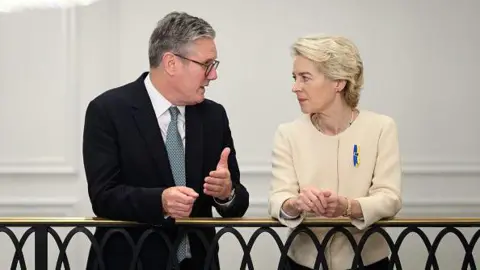 Getty Images
Getty ImagesSir Keir Starmer will head to Brussels for the first time as prime minister next week to meet European Commission President Ursula von der Leyen.
The visit comes as the European Union appears to be willing to compromise with the UK over a new deal to allow more freedom for young people to travel around Europe.
The EU’s ambassador in the UK, Pedro Serrano, has suggested a scheme allowing young people to move freely during a gap year – rather than for longer.
However, Sir Keir has said that the government had “no plans for a youth mobility scheme.”
Mr Serrano has told Times Radio: “If we have a mechanism that allows young British citizens to go out for a gap year, for example, to any – they have a choice of 27 states within the European Union – to do a bit of learning and pay there for their learning while they’re there. Why not?
“If people want then to stay later for work, it’s a totally different process. This would be limited in time.”
The idea is much more restrictive than some have suggested a youth mobility scheme could look like.
The European Union would like to give its young people the opportunity to travel freely to the UK, in return for young people from the UK being able to do the same in the EU’s 27 member states.
The prime minister has frequently talked of what he calls a “reset” with the UK’s European neighbours since Labour won the general election.
He has visited Germany, France, Italy and Ireland since he came to power in July.
But, until now, he hasn’t visited Brussels.
EU officials frequently make clear, both publicly and privately, that any changes to the arrangements between the UK and the EU will have to be negotiated directly with Brussels, rather than with individual capitals.
Brussels sources say they have welcomed Downing Street’s tone in recent months but that won’t on its own unlock any substantial changes in the post-Brexit deal between London and Brussels.
The government has ruled out rejoining the EU, or its individual big projects – the single market and the customs union.
Membership of the single market would oblige the UK to accept freedom of movement – where citizens of any members of it can move freely between member countries.
Many at Westminster conclude that unlimited immigration from the EU was a motivating factor for many to back leaving the EU in the referendum in 2016.
The prime minister was a passionate supporter of Remain in the referendum and later campaigned for a second referendum.
Senior Labour figures are aware that some who backed Leave might be suspicious of the government’s true intentions – and so made their red lines on negotiations with the EU very clear in the election campaign.
The political difficulty of a youth mobility scheme is some would see it as at least a partial return of freedom of movement, for some people, for a fixed period of time.
It is also likely, given the EU’s size, that more young people from the continent would come to the UK than vice versa.
EU figures insist it would be nothing of the sort.
Mr Serrano said: “There is the fear of migration. It’s a big topic not only in this country but in Europe as well. And we have to see how we’re going to be facing that working together more effectively. But it has nothing to do with the youth mobility scheme.”
“The government would like to negotiate a veterinary agreement to remove some border checks, help touring artists travel around Europe and get a deal where the UK and EU recognise the professional qualifications of each other’s people.”


